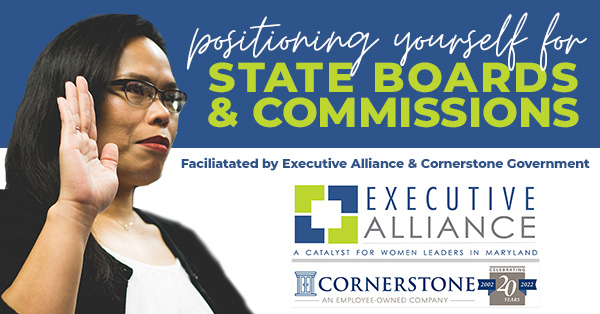By Gina Gallucci White
With Wes Moore’s historic gubernatorial victory during the general election in November, the Democratic Party will now take back control of the executive branch of the state government. With this new administration comes around 1,700 government appointments to boards and commissions among others.
As a way to help women position themselves for success, Executive Alliance hosted a recent Zoom discussion featuring Cornerstone Government Affairs’ Delora Sanchez Ifekauche, principal, and Ellen Valentino, senior consultant. Members were able to ask questions and learn tips on ways to get noticed during the selection process. Executive Alliance will help members strategize potential appointments on Dec. 7 and 14th.
A majority of those selected for boards and commissions will be appointed while about 20 will need confirmation by the state senate. A full list may be found here: https://msa.maryland.gov/msa/mdmanual/26excom/html/00list.html
Ifekauche notes there is probably an existing commission, board or work group within the state that would match well with an individual’s expertise that would welcome a new member. “Another thing to consider now that we have a new administration is there may be new boards that are created by executive order but most are created by statute if they are a particular commission that are termed to study a particular issue,” she said. “I would definitely encourage attendees to take a look at that list and see what might be most advantageous for you to seek out.”
So who is tasked with ensuring these appointments are diverse with the right qualifications and coming from multiple locations across the state? Besides Gov.-elect Moore, the task mainly falls to Tisha Edwards, chief of staff for Moore’s election campaign and her office. Del. Adrienne A. Jones, Speaker of the Maryland House of Delegates and Sen. Bill Ferguson, President of the Maryland Senate and their respective office staffs also make some appointments.
Some boards and commissions have staggered terms to allow individuals with historical knowledge to help to onboard folks that are coming in with new appointments. “There will be some hold outs from the (Larry) Hogan administration,” said Ifekauche. “There may even be some hold outs from the (Martin) O’Malley administration depending on how long folks have been on a particular board and whether or not there are term limits and if they have continued to serve on the board over time.”
Some appointments are more urgent and prominent than others. “Each sets guidelines and policies that affect Maryland residents,” she said. “…It is not just one path to serve on some of these boards and commissions. There are many ways to be appointed.”
Ifekauche encouraged attendees to also consider local government opportunities for board and commission appointments.
Rebecca Snyder, EA’s executive director, asked the panel how political the process is for appointments. If you don’t know people in positions of power, is there a path forward?
Ifekauche said the political aspects of appointments all depend “on the board and the commission to be very honest with you. Some are very highly coveted positions and they are very political. And then there are others where they would just like to find the best qualified candidate and the process is pretty standard.“
On a very baseline level, an individual can expect to send in their credentials like you would for any other job or career position and expect a lengthy vetting and interview process. Individuals may reach out to various people in the political world they know and ask for letters of support for an appointment.
“It has been my historic observation that the governors and legislators, when they form a board, they do want diversity, geographic diversity and they want good citizenship and good citizens and expertise,” Valentino said.
Snyder asked about the qualifications one needs to serve on a board or commission, and whether political affiliation matters. Ifekauche shared that Moore has said he wants to create a diverse administration with qualified candidates from all parties.
“I think one of the things that can be a major deal breaker on some of these boards are potentials for conflicts of interest so you have to be very clear on what the qualifications are, what the exclusions might be,” Ifekauche said.
“While there are boards where your expertise in a particular industry is welcome and is a great asset, there are other instances on boards where it specifically said that you can not be in this part of industry. Those are things to consider. …I would say to really put your assets on display. Things that you might not think would be helpful or useful to you may very well be the thing they are seeking.”


